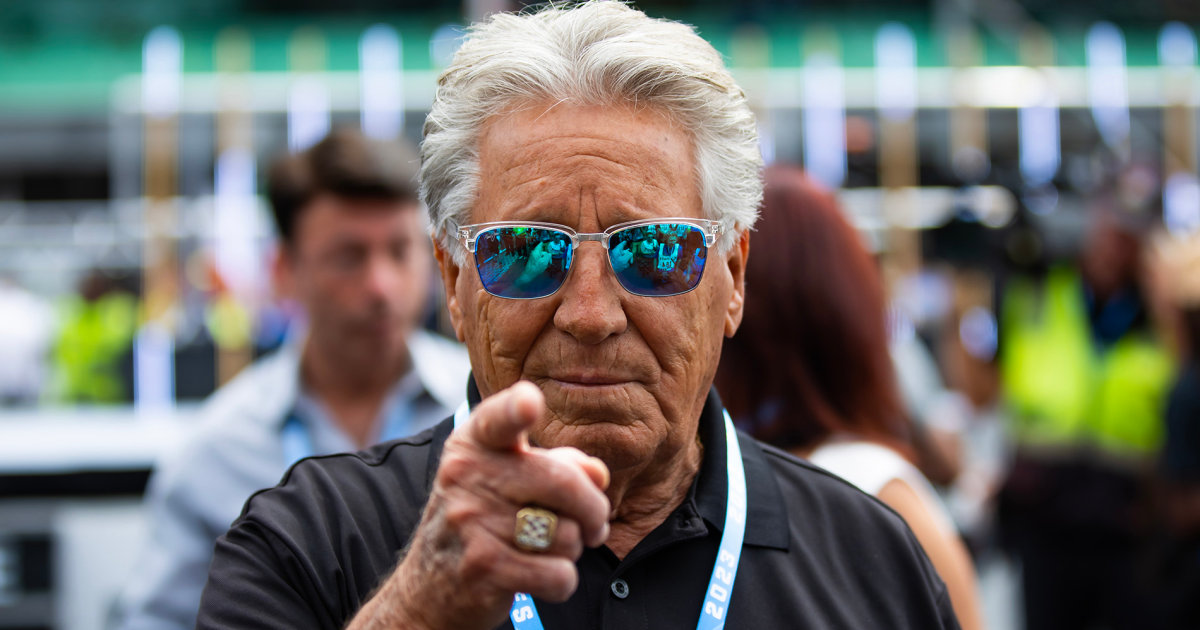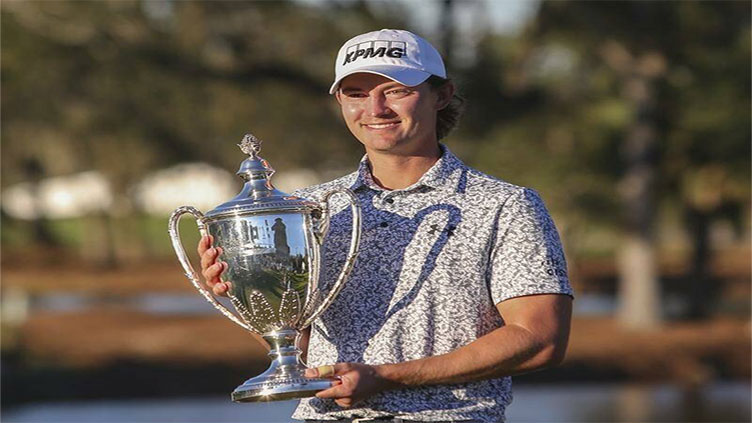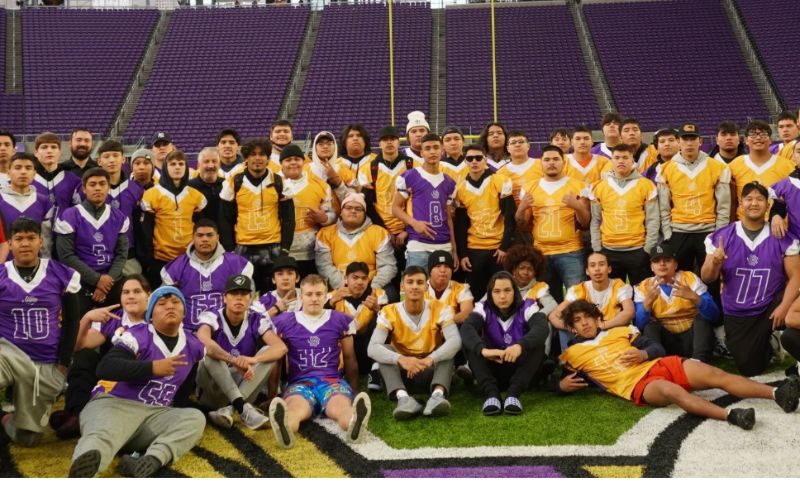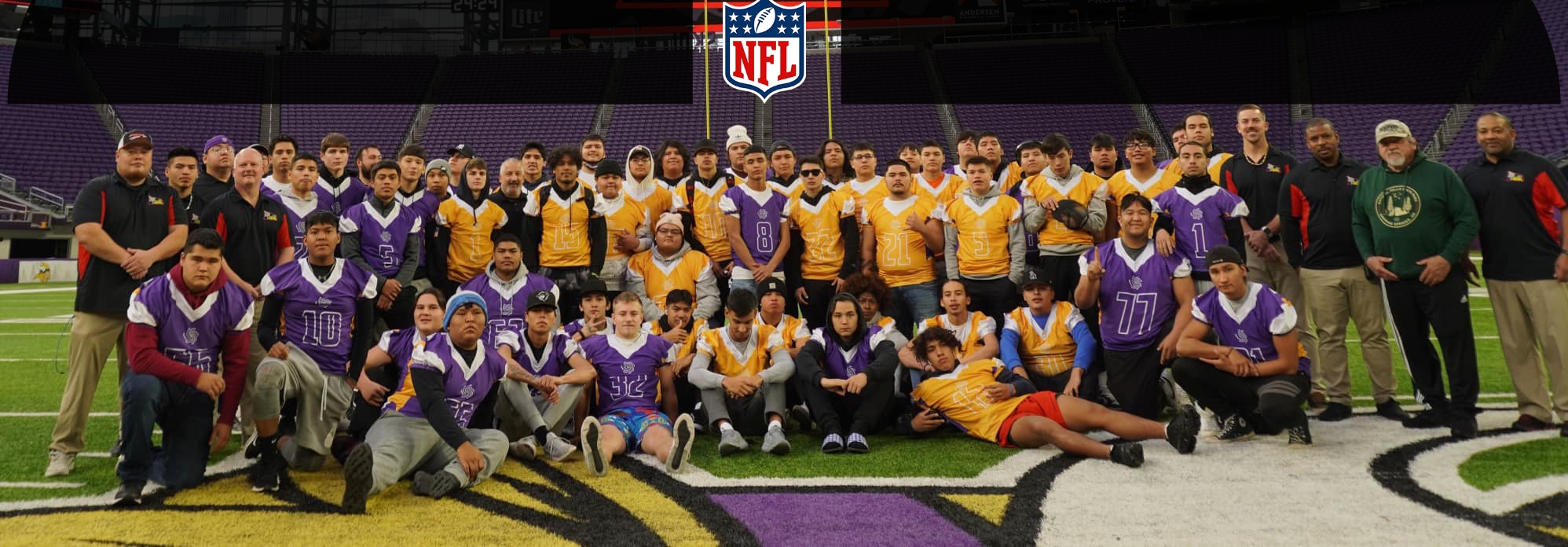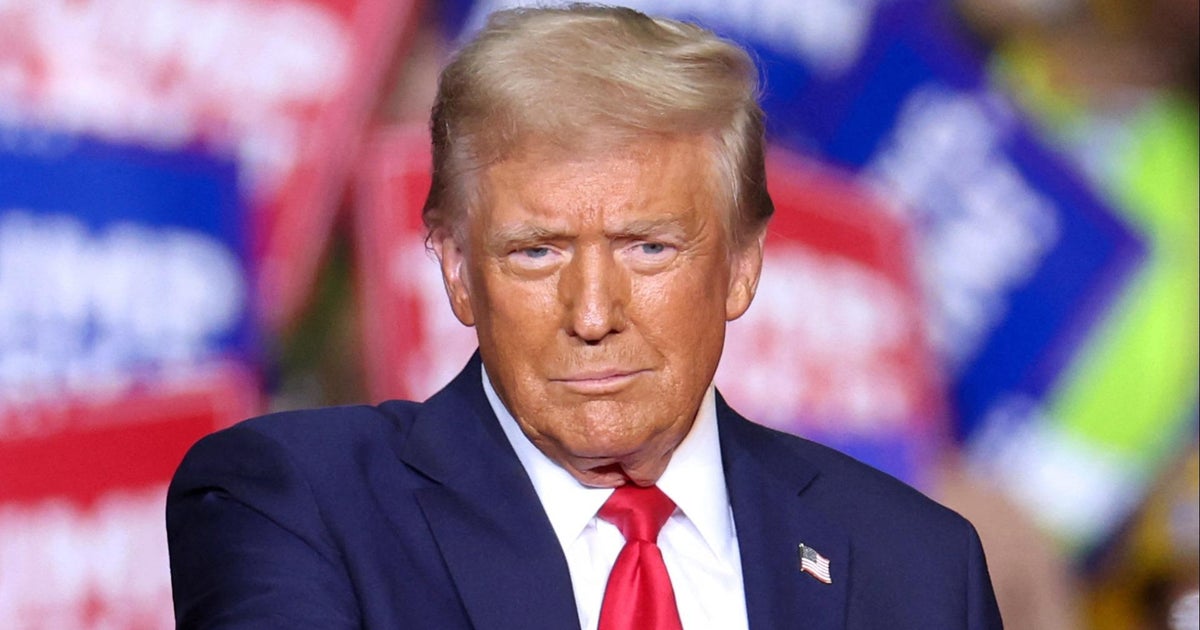Aaron Hernandez’s Notorious Case Gets the True-Crime Drama Treatment. The Result Is Surprising.
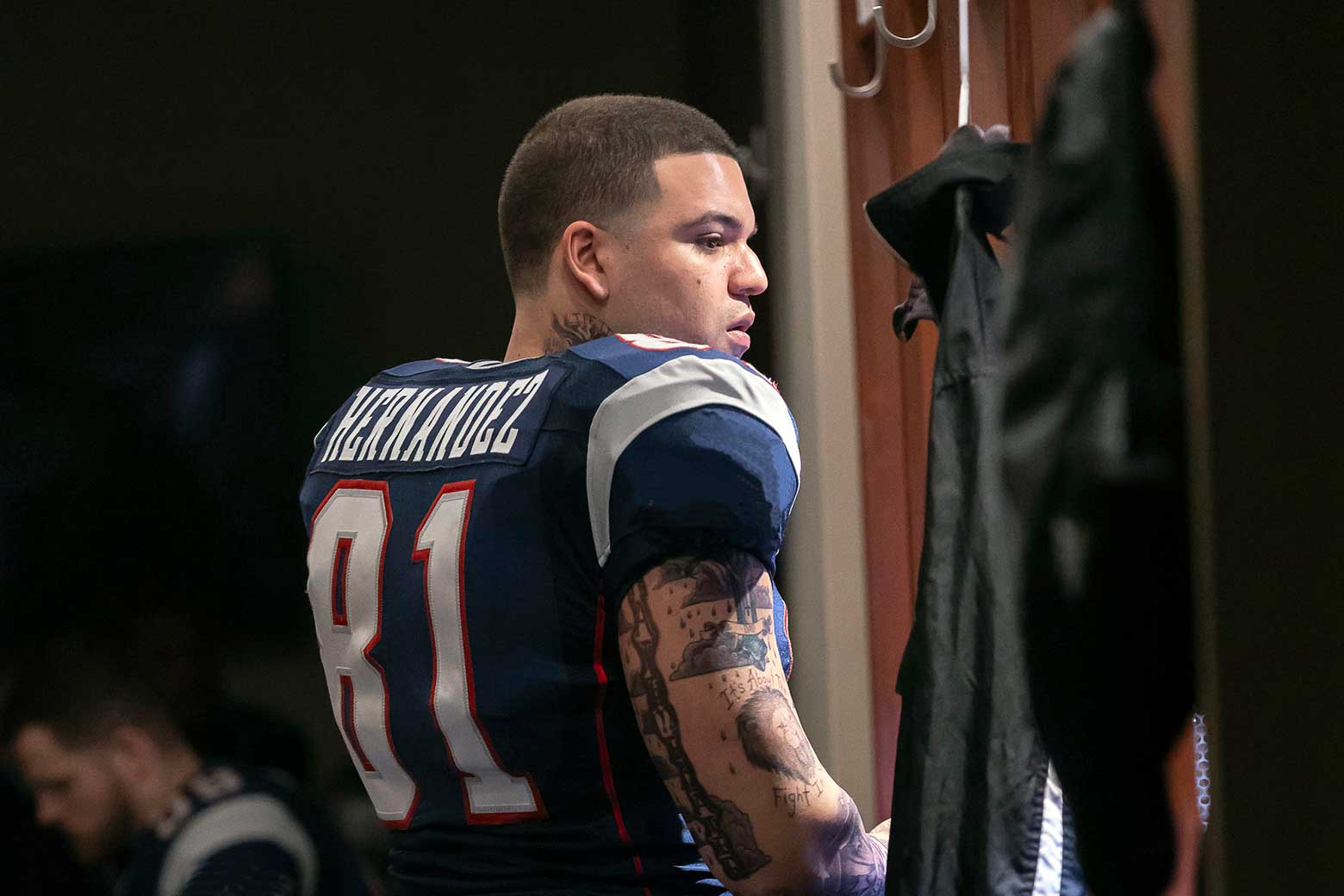
You wouldn’t be unreasonable to approach American Sports Story: Aaron Hernandez with some measure of apprehension. After all, the FX series is a true-crime drama, and one executive-produced by Ryan Murphy (among others) to boot. Given Murphy’s other new true-crime show, it wouldn’t be a complete surprise if this one, about the football player–turned–convicted murderer Aaron Hernandez, also tended toward sensationalism. But somehow, American Sports Story gets a lot of things right. A scene in the first episode is a jolt, turning many football fans into that one Leonardo DiCaprio meme pointing at the screen: “That’s Steve Addazio!” The Florida Gators assistant coach pulls up in a sedan to pitch Hernandez—a sought-after recruit in Connecticut, seven years before he would murder Odin Lloyd—on playing college ball at Florida. Scot Ruggles, who portrays Addazio, resembles the coach so much it’s uncanny. This is only the first indication that the series’ casting, among other decisions, was right on the nose.
Ruggles is just one of several cast members on American Sports Story to be a dead ringer for their character. Former Hamilton stage actor Josh Rivera is a pretty convincing Hernandez. The most impressive bit of casting is Tony Yazbeck as Urban Meyer, Hernandez’s national championship–winning head coach at Florida and the man widely thought to have run an out-of-control program that did not demand accountability from its players. I am a college football writer and podcaster by trade, and the moment that drove home just how real this show looks was a wide shot of Yazbeck, playing Meyer, dressed in the same oversize long-sleeve tee and gym shorts that Meyer would typically wear at Florida practices in the 2000s.
This is an enduring strength of this season of American Sports Story. It looks just like the world it drops you into, not just in its casting but in its depictions of locales from dreary suburban New England to Southeastern Conference football stadiums to the National Football League. The story takes its cues from its source material, a 2018 Boston Globe podcast, Gladiator: Aaron Hernandez and Football Inc. Most of the events the show depicts are supported by a vast record of reporting on Hernandez, with the show’s main leap being that it takes for granted that Hernandez was a closeted gay man whose sexuality deeply affected his relationships. The record generally supports that too, though Hernandez never confirmed it before he died by suicide in prison in 2017, at the age of 27.
American Sports Story does not break new ground in our understanding of Hernandez, the star tight end for the New England Patriots who murdered associate Odin Lloyd in what the show (along with the real-life evidence) frames as a rageful but planned execution. There is not much new to learn about a guy whose murder trial was one of the most public of its decade and who died without expanding much on his crime. That may have been because Hernandez, after being acquitted in a separate murder case, was still trying to get his conviction for murdering Lloyd overturned when he ended his own life.
The show does not get inside the mind of a killer. But it does paint a useful—albeit imperfect and sometimes hammy—picture of the places that the killer inhabited as he took a darker turn. American Sports Story inspires empathy for Hernandez without offering sympathy, and it does that by showing his world as it was. Or, at least, it offers a plausible interpretation of Hernandez’s surroundings as he barreled toward the end. Winding through his life chronologically from the time he was around 17, it shows the ways Hernandez’s support systems pampered and tortured him. The series can’t tell us why Hernandez murdered Lloyd, but it can throw a few punches at different people and institutions that might have changed his path at one point or another.
As a teenager, Hernandez is a high-profile recruit, but he’s also a kid who’s never been quite good enough for his abusive asshole of a father, Dennis (Vincent Laresca). He is a victim of child sexual abuse at the hands of an uncle. His mother, Terri (Tammy Blanchard), is both a victim of his father’s mistreatment and a lousy parent herself. The family wants Hernandez to follow in the footsteps of his dad and older brother and play as a tight end for the University of Connecticut, and that’s exactly the plan—until Florida swoops in. In another fine bit of college football realism, the show suggests that UConn’s head coach will penalize Hernandez’s less talented brother after his highly touted younger sibling reneges on a commitment to the school.
The show’s portrayal of the college recruiting process is strong and specific, right down to naming the era’s most popular website for ranking high school players nationwide. (Yes, it was Rivals.) And once Hernandez is at Florida, the show dives into the athletic department’s lax approach to players who get in trouble. Hernandez coldcocks a bartender and is briefly detained, but a fixer arrives to keep him out of trouble and urges him to channel his aggression into games against the University of Georgia.
Hernandez is a good player at Florida, a bona fide star by the end of his time there, and the Patriots take him in the NFL draft. There, American Sports Story shows the ways the league sets him up for success and failure. He takes a trip to the NFL’s rookie symposium, where he gets a healthy warning about all the ways the league’s players can blow their money and careers. He joins a Patriots locker room that’s thought to have a strong culture, led by Tom Brady (Ross Jirgl). He signs with an agent who represents him well and sets him up with solid training facilities and a trainer who becomes Hernandez’s sexual liaison.
Yet Hernandez also deals with NFL pitfalls. An ankle injury leads to a painkiller addiction as he tries to get back on the field. Repeated blows to the head add up. Hernandez becomes cold and distant toward his fiancée, Shayanna Jenkins (Jaylen Barron). When Hernandez asks Patriots coach Bill Belichick (Norbert Leo Butz) to trade him to another team so that Hernandez can be farther away from a former friend who now wants to kill him or take his money, Belichick, true to real life, declines.
For Hernandez, a temper that was always short becomes shorter as his life deteriorates. By the time he murders Lloyd at a construction site, you feel as if you’ve gotten a good window into his descent. Later, a prison guard strikes Hernandez in the head with a baton while breaking up a fight, and the slow-motion impact calls to mind all of the blows to the head Hernandez absorbed as a player.
The show wants you to be cognizant of just how many things broke against Hernandez before he did evil. In service of that goal, the writing is sometimes a bit cheap. For example, the series really wants to play up how big a star Hernandez was in college, part of an effort to accentuate how harmful the spotlight may have been to his development. After Florida wins the national championship, a throng of cameras on the field surround only Hernandez—a curious thing for a tight end who was third on the team in receiving. In another scene, Hernandez gets a spontaneous round of applause from a bunch of students walking across campus, apparently overwhelmed by the celebrity of their classmate and tight end. (Tim Tebow may have gotten this treatment in Gainesville. It seems doubtful that Hernandez did.)
Later on, police come to Hernandez’s home to respond to a domestic disturbance in which he menaced Jenkins. The police leave without incident, though, and one of them, as she leaves, jokes with Hernandez that he is on her fantasy football team. In a different scene, a group of Patriots players’ girlfriends and wives speak in gold digger–adjacent terms about marrying their wealthy partners, while understanding that those players are likely to cheat on them with hot young women—a too-easy cliché that seems a disservice to both the players and their wives. In many ways, the NFL really is a big, rapacious machine, but in service of hitting home that point, the show also understates the extent to which Hernandez’s crime shook people in the sport. For example, American Sports Story depicts Belichick as having given a curt statement about the murder in which he said he won’t speak about it again. In reality, the typically dour Belichick gave a long and introspective press conference after Hernandez’s arrest.
The series doesn’t need to work as hard as it does to demonstrate how an NFL career could break so bad. Hernandez’s biography speaks for itself, and college football and the NFL contain sufficient dangers that most people who watch the show will receive the message on their own. Near the series’ end, viewers see a collection of real-life media commentators weighing in on Hernandez’s diagnosis of unusually severe chronic traumatic encephalopathy on his brain. Some express more sorrow for Hernandez than others. Belichick, his last head coach, doesn’t have much interest in talking about Hernandez’s brain at all. (On that, the show is on the money.) FX took creative license, but the systems it displays faithfully were fraught enough.
Related
Sports Roundup: Ager earns All-American honors – eagletimes.com | Serving…
By DAN BARILE Eagle Times Correspondent Ager earns All-American honors Wesleyan junior Stephanie Ager added a new accolade to h
Formula 1 approves GM-Cadillac as an 11th team starting in…
Formula 1 announced Monday that it has approved the entry of GM and Cadillac as a new team on the grid, bringing a storied American car maker into the pinnacle
Sassy Cassie: OSU vs. Michigan is the best rivalry in…
It is known as “The Game.” The Ohio State University Buckeyes versus the University of Michigan

